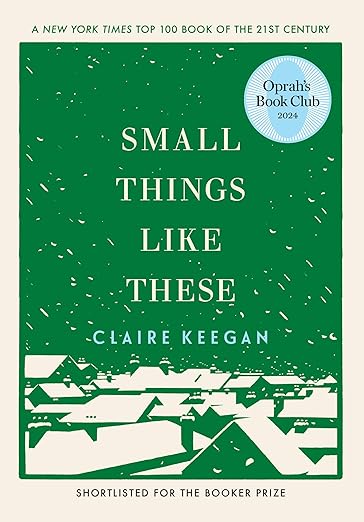
November 30, 2021
128 pages
Hardcover
$20.00
While my bookshelves constantly expand, the selection of books I pick up again and again is smaller. I was recently asked: “What makes you want to re-read a book?”
I re-read because something calls me back. I re-read because there are ideas and images that hit so hard, I need to grasp for them again. I re-read to study what an author did to draw me in, to craft a character who sticks with me long after the last page. I re-read because, like hiking the same trail in different seasons, where I am in life—or in the year—can change the scenery, shift my perspective, and draw my attention to new details.
Christopher B. Nelson says it this way: “Re-reading the same book produces new insights because the reader is a different person. Indeed, a good book is very much like a mirror: The glass is the same year after year, but the reflection in it changes over time.”
I’ve read Claire Keegan’s Small Things Like These at least four times, but thumbed through it countless other times. A slender novella, the book is heavy with images and ideas that my soul and mind need to revisit. It’s not a happy story, per se, but a good one. A story that reminds me that those quiet murmurings of our hearts, what some might call nudges of the Holy Spirit and others might call a conscience, are worth listening to.
Keegan tells the story of Bill Furlong, an Irish coalman who is steady in his work, devoted to his wife and five daughters, and grounded in a strong sense of duty. Set in the weeks leading up to Christmas in the mid-1980s, the story follows Fulong as he focuses on providing for his family and delivering the coal that keeps his small town warm. But while he appears quiet and reserved on the outside, an inner turmoil stirs within him.
Furlong, we are told, “had come from nothing. Less than nothing, some might say. His mother, at the age of sixteen, had fallen pregnant while working as a domestic for Mrs Wilson, the Protestant widow who lived in the big house a few miles outside of town.” After his mother’s early death, Furlong is raised by Mrs. Wilson, her employer, and is never certain who his father is. Though he’s now built a stable life and home, Furlong can’t seem to wash away the coal and shame that stain his hands.
Early on Christmas morning, while making a delivery to the local convent, Furlong discovers a young girl locked inside the coal shed, shivering from the cold. He gives her his jacket and brings her to the convent door. There, the girl—who he later learns is named Sarah—asks about her baby, who was taken from her. When the door opens, the Mother Superior greets them warmly and invites them in for tea and polite conversation, gently pressuring Sarah to admit she must have been accidentally left behind after a game of hide-and-seek. As Furlong prepares to leave, he is handed a Christmas bonus—a convenient gift meant to ensure his silence.
Keegan’s book was the first I had heard of Ireland’s Magdalene Laundries, institutions usually run by Roman Catholic orders, that held and housed unmarried mothers, young girls considered “fallen” who were forced into labor. These institutions, supported by the Irish state and operating until the late 1990s, were sustained not only by official complicity but also by the silence of communities—by the willingness of ordinary people to look away and mind their own business.
But after meeting Sarah, Furlong finds it harder to ignore the dark reality of the Laundries, and the girls trapped within them, especially the one he met, the one who begged him for help. Furlong is unable to silence the rumbling in his head and heart, the one that asks: Should he do what is expected or what he is called to?
He knows there is nothing sensible about doing the right thing; there will be no reward for it, only the kind of trouble that comes—especially in a small town— from minding your soul’s quiet promptings rather than the status quo.
Furlong finds himself asking: “Was there any point in being alive without helping one another? Was it possible to carry on along through all the years, the decades, through an entire life, without once being brave enough to go against what was there and yet call yourself a Christian, and face yourself in the mirror?”
And in that, we find a question for all of us: in what ways does our faith require something of us? What is the value of a faith that sits quietly and obediently in Mass while young girls suffer just steps away?
At just 128 pages, Keegan’s book is among the slimmest ever short-listed for the Booker Prize. In an interview about the prize, Keegan was asked about the brevity of Furlong’s story: “I’m more interested in going in than going on, “ she said, and then cited Chekhov: “Grace is the least number of movements between two points.”
Understated, like her main character, Keegan said a longer novel would not suit Furlong’s personality, so she chose to “abide by his reserve.” When discussing her writing, both Small Things Like These and Foster, another quiet, yet poignant novella, she admits the wrestling required to get the words down. “It seems to me that all good stories are told with varying degrees of reluctance—and in my case, the author, too, is reluctant to go in. But not writing is almost always more difficult than writing.”
I will pick up anything Keegan writes. Her books hold power in their sparseness, in their restraint, in the careful attention to every detail, every line. Small Things like These is beautiful and haunting due to its precision—its ability to convict not just Furlong, but all of us—without a hint of patronizing or preaching.
Keegan tells us, “Elegance, to me, is writing just enough.” And her writing is more than enough to draw you in—or to draw you back to reveal something new in its reflection.


8 Responses
Lovely piece. Beautiful book, I agree. So is her book Foster. Keegan gets at the essence of what it means to be human, and as you said, to have the courage to listen to your heart in regard to getting involved with humanity.
I’m particularly intrigued by the line, “Grace is the least number of moments between two points.” I know this line was said about sparse writing, but it fits well with another matter of interest to me. I have always questioned the value of getting fussy about an “order of salvation.” There may be a time and place for that, but trying to figure out the “mechanics” of how God graciously saves us seems to undercut the graciousness of it all. It’s like pedantically explaining why you helped someone.
A great essay about an important book. This story teaches us all how we can be better people. It is not ea I know she said she had written enough, but I would love to know what happens when Furlong brings Sarah home to his family. The line ” Was there any point of being alive without alive without helping on another” says so much.
Two excellent books/movies about the Magdalene Laundries are “Philomena” and “The Magdalene Sisters” (from 2002). Harrowing, heartbreaking indictments of the church, its followers, the state, and how it takes so many entities working together to create something really awful, though it started with good intentions.
“Small things Like These” has been made into a fine film.
A re-read for me too. What a beautifully restrained and precise and inviting review, Dana. Thank you. Re-
reading Pilgrim at Tinker Creek. It’s a new book! 😊🙃
Our book club read and discussed Keegan’s Small Things Like These this past season, and to me it was the novel that moved me most. It says more in 128 pages than many a 400-pager does. (A small aside, the book is somewhat pricy, but well worth the price).
I do freelance editing of fiction manuscripts, and interestingly, several months before our book club discussion of Small Things Like These, I’d edited a novel manuscript sent to me by a writer in Ireland and set where? In the Magdalene Laundries. Small world.
And yes, the film is excellent.